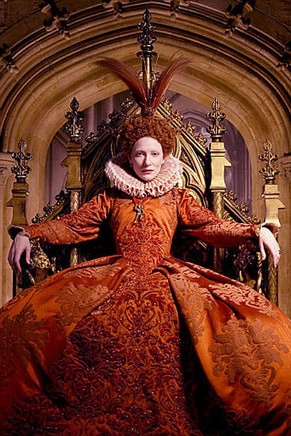 When I was nine or ten, I wore a terrific fancy dress costume in the form of a Norman soldier. My wonderful creative father created it, using a range of ordinary materials, including papier mache. I wore it for a fancy dress contest in which I entered with my sister. I was proud of it, particularly of how striking it was, and, above all, because of my father's outstanding skills. Yet, for all that, I felt lost, betraying myself, and even entombed in it, As I looked at my sister's costume, another amazing creation of my father, I knew I so much wanted to be wearing that. For hers was a fabulous Elizabeth 1 dress, with impressive mock velvet, a sumptuous skirt and puffed sleeves, and a charming collar, colours, and pleats. I was so captivated, yet strangely not envious of my sister herself, and was hugely delighted when she won the contest. For she looked even more gorgeous than she usually was, and that dress deserved its just reward. But a little bit of me cried inside. For all kinds of reasons, I'm constitutionally not cut out to be a Norman soldier. I never was. So it was a powerful symbol of my captivity... Bringing together what is inside and outside is not easy for anyone. We all have our masks and uniforms to defend ourselves from the perceived, and actual, hurts of others, and from ourselves. Some of us hide within such bounds for so long it can be too hard to escape at all. Yet the desire for freedom and life is strong, and we long for a day, or even a fleeting moment, of liberation. Perhaps, being English, and as a person so imbued to my depths with history, that is why those costumes spoke, and continue to speak, so powerfully. For Norman is a deep symbol of oppression for the historically aware English: a reminder of the worst kind of 'masculine' violence, which overpowered, raped, and subjugated the ancient peoples and cultures of our native land. In contrast, there is a reason for continued obsessions with the greatest of the Tudor monarchs. In some sense Elizabeth 1 stands symbolically for the power of the native feminine entwined in a more protective masculine; for our autonomy, our longings to be, our distinctive character, and our hope and glory. Not for nothing is this also memorialised in Elizabeth's famous Tilbury speech to her troops, where, dressed herself in armour, she proclaimed herself as England's gender queer saviour, with the body 'of a weak and feeble woman' but with 'the heart and stomach of a king,' No wonder Elizabeth was so attentive to dress and fashion - see further Elizabeth 1's Royal Wardrobe. She knew how significant was the relationship between identity and expression.
How much was Elizabeth 1, as 'Gloriana' the 'Virgin Queen', trapped or free in her own dress and bearing? Any of us who have public roles need frequently to reflect upon the dangers of the sacrifice of self, and the nurture of false selves, to which they give rise. Dressing entirely to please can sometimes be a luxury we cannot afford. Yet there are garments and masks we must also leave behind for the good of our soul. Looking back, I wonder how much I wore that Norman costume because it reflected my alienation. In those days, especially in such a conservative rural area, I simply had no vocabulary, mental or otherwise, to make sense of my feelings and express them. Yet that fancy dress contest was a sure pointer!
3 Comments
Josephine Inkpin
6/21/2022 05:47:08 pm
thankyou :-)
Reply
6/13/2024 09:23:08 am
In any case, a tad of me cried inside. For a wide range of reasons, I'm intrinsically not removed to be a Norman fighter. I’m so thankful for your helpful post!
Reply
Leave a Reply. |
AuthorThe Revd Dr Jo Inkpin: Archives
March 2024
Categories
All
|
 RSS Feed
RSS Feed